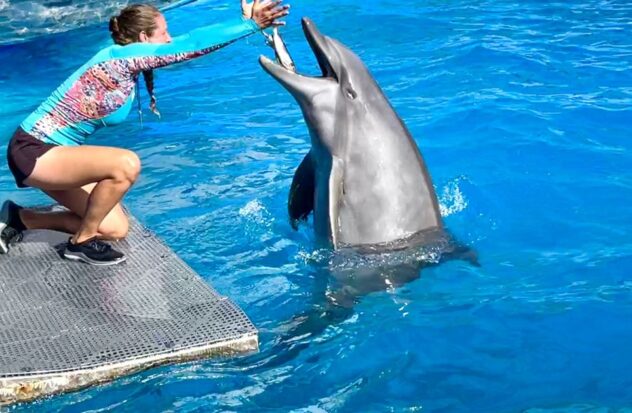A reflection of the previous problem is the “stretch and shrink” soap opera between Miami-Dade County and The Dolphin Company, the tenant of the Seaquarium. In a never-ending saga and under the justification of alleged violations, Mayor Daniella Levine Cava announced that she was unilaterally terminating the contract and the company in question, challenged the eviction order and filed a million-dollar lawsuit. The date of the ultimatum was April 21, 2024. The measure is based on a history of worrying violations, related to inadequate maintenance of the property and the living conditions of the animals, allegedly contravening legislation and contractual terms agreed.
When the facility management contract passed from Palace Entertainment Holdings to MS Leisure Company Inc in March 2022, Levine Cava emphasized the priority of ensuring high standards of animal care and welfare, especially for the orca Lolita (Tokitae), an iconic figure from the park. (She is already deceased). The contract stipulated that The Dolphin Company, as tenant, must remove Lolita and her dolphin companion Li, in addition to operating the Seaquarium in compliance with federal laws, including the Animal Welfare Act, and maintaining various certifications, including that of the Alliance of Marine Mammal Parks and Aquariums (AMMPA).
However, between now and today, The Dolphin Company has received multiple citations from the Department of Agriculture (USDA) for deficiencies in veterinary care, improper facility management, and lack of hygiene. Furthermore, the absence of certifications and the lack of reports on conservation and education programs have aggravated the situation.
The USDA report from last Nov. 28 found dolphin pools in disrepair, high bacteria counts in the water where the marine mammals are kept, and numerous areas of black mold growth along with bubbling paint inside the penguin enclosure.
Edwin González, CEO of The Dolphin Company, refutes the accusations, argues for compliance with regulations and commitment to animal welfare. González directly points out and accuses the county of misrepresenting the corrective actions taken by the Seaquarium and questions the validity of the contract termination.
In a letter to Miami-Dade’s Chief Operating Officer, Jimmy L Morales argues that the mayor’s cruelty overlooked the substantial efforts and contributions made to ensure the well-being of marine animals. Additionally, after a thorough internal review and consultation with independent experts, he claims to have found solid evidence that contradicts the county’s claims.
The tenant company maintains that the reasons for terminating the contract are unfounded, both in factual and legal terms. González highlights the improvements made by the company in the floating platforms and cages, for which approximately $200,000 was allocated.
It also notes that the ongoing repair work has taken time due to the extent of deterioration of the facilities at the time The Dolphin Company took over the lease just over two years ago. Which has resulted in an investment of close to 2 million.
Meanwhile, Morales emphasized the administration’s commitment to ensuring proper care of the animals, whether at the Seaquarium or elsewhere, strictly following the law and seeking the best future for the site.
The situation, however, has generated mixed reactions among visitors to the Seaquarium.
María Estrada, a Miami resident, told DIARIO LAS AMERICAS that: “You are used to all these political games and you never really know for sure what is hidden behind the decisions. You have to look at who benefits from the closure, in the hands of who will end up with the land or the rent. When the money trail is known, the idea will be clearer. For now, I feel sorry for the children who will not be able to visit the facility and have contact with the marine flora and fauna.”
Meanwhile, Josefina Cabrera, from Hialeah, believes that “both zoos and aquariums are cruel. They should close them all, although I recognize that those animals that are born and raised in captivity could face too many obstacles to survive in a natural habitat.”
For their part, the facility’s employees are surprised by the situation and defend their dedication to the care of the species.
In this game of commercial chess, the Seaquarium filed a federal lawsuit against the county. The extensive 32-page brief lists a series of complaints that include perceived unfair regulatory practices, breach of contract, economic damages and damage to its reputation. Compensation of 35 million is sought. This legal move adds a new dimension of complexity to the dispute and raises questions about the future, not only of the Miami Seaquariumbut rather the county’s relationship with private companies.
Animals in raffle
In the midst of this legal confrontation between the Seaquarium and the County, the fate of the animals, the employment of hundreds of workers and the future of this iconic tourist attraction in South Florida remain in suspense.
Councilwoman Levine Cava said, “To be clear, the animals belong to the company, not the County.” She explained that the County does not have the authority to intervene, and that only the United States Department of Agriculture can do so. She confirmed that Dolphin Company, as owner of the animals, could transfer them to other parks within her portfolio.
Commissioner Raquel Regalado added that the situation varies depending on each animal, as some are owned outright, others are leased, and some could return to their original leases.
Morales, meanwhile, indicated that the County is developing contingency plans in case the Dolphin Company leaves the animals if it finally leaves the facility. These plans include collaborating with federal partners who have jurisdictional and regulatory oversight over certain animals, as well as evaluating county resources, such as Zoo Miami, where permissible. In those cases, it would be the decision of the federal agency and the private partner hosting the animal, and not Miami-Dade County.
“I care about the animals, no one seems to care, neither the County nor the aquarium. “This is about money,” says Carlos Padrón, a retiree from Miami, adding: “This is the story of the good pipe, while things drag on, the elections arrive and there are too many problems that affect the taxpayers, whom They are not given the necessary attention.”
As if that were not enough, and adding fuel to the fire, the USDA also found that the facilities continue to have an inadequate number of trained employees in the veterinary care department, employing only one veterinarian to care for 46 marine mammals, 50 birds and hundreds of fish.
At the time of this information, the doors of the Seaquarium remain open with everything and an evacuation order. Mayor Levine Cava, Commissioner Regalado and the chief of operations are investing political capital and time in this battle full of loopholes. Meanwhile, many County residents are really wondering who these decisions benefit. Do you want me to tell you the story of the good pipe?




